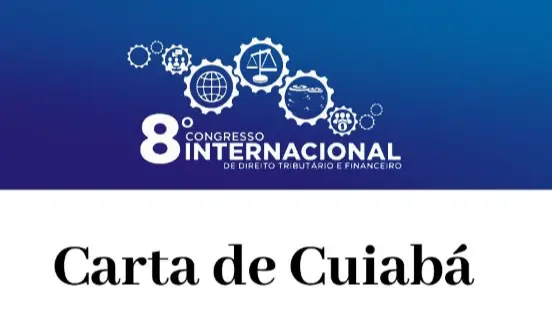
As a result of the debates of the 8th International Congress on Tax and Financial Law, the Charter of Cuiabá was released as an alert to society and institutions about the impacts of the Constitutional Amendment no 132 of 2023 on public finances of States and municipalities.
Signed by national authorities in the areas of Taxation and Finance, the document points out that the new formulation of the Brazilian Tax System represents a centralization of the tax center in the Union, to the detriment of the autonomy of the federal entities, especially the municipalities, those most affected in the new distribution of competences.
The letter was built over the two days of congress, held by the Court of Justice of the state of Mato Grosso (TJMT), through the School of the Judges (Esmagis-MT), and by the Court of Auditors of the State (TCE-MT), via the School of Accounts, with the support of the Brazilian Society of Financial Law and other partner institutions.
From a technical and critical analysis, the text reinforces that the new model ignores the structural, economic and social diversity of Brazil. "Change accentuates inequalities and imposes serious risks to essential sectors of the economy, such as agribusiness and mining", highlighted Justice Márcio Vidal, proponent of the letter.
According to him, the new structure demands increased attention from public institutions so that the system of collection, planning and execution does not become even more complex.
“We need to study and seek knowledge to mitigate the impacts. Who will solve the problem is each of us, with a greater interest in the social problems we face, such as hunger, violence and tyranny", he said.
The letter proposes, as a measure to improve the reform, the review of the criteria for sharing the resources of the Regional Development Fund (RDF). The suggestion is to include, alongside the FPE and the population, criteria that take into account the logistical, productive and economic realities of each State - as already occurs in the distribution of compensations provided for in the Kandir Law (LC no 176, 2020).
Another point of attention is the creation of the Management Committee, provided for in the reform, but still without a clear definition of its legal nature and without guidelines for control and supervision.
For Judge Gabriela Carina Knaul, organizer of the Congress and the Charter, the document is a starting point for the technical follow-up of the transformations brought by the reform. "The plurality of views on reform shows us that we need to promote in-depth debates and evaluate all the challenges that arise. A technical group will be formed to monitor the content of the Charter and monitor the transition period", she said.
The Charter of Cuiabá was signed by the organizers of the congress, partner institutions and various participants, with the aim of contributing to the improvement of the tax reform in respect of the federal autonomy and regional diversity of the country.
Text with information from the Communication Advisory of Esmagis – MT (School of the Judges of the state of Mato Grosso)




